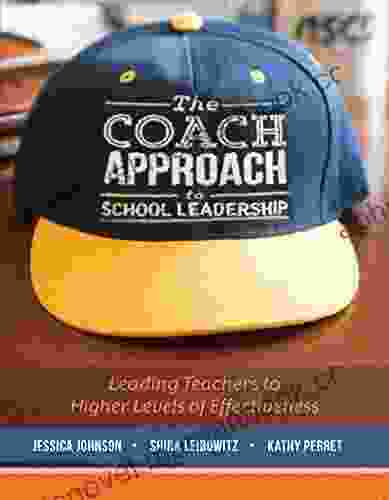Leading Teachers to Higher Levels of Effectiveness: A Comprehensive Guide for Educational Leaders

In the dynamic and ever-evolving field of education, the effectiveness of teachers plays a pivotal role in shaping the academic success and overall well-being of students. As educational leaders, it is imperative that we prioritize the continuous growth and development of our teaching staff to ensure that they possess the knowledge, skills, and dispositions necessary to empower all learners to reach their full potential.
4.5 out of 5
| Language | : | English |
| File size | : | 1923 KB |
| Text-to-Speech | : | Enabled |
| Enhanced typesetting | : | Enabled |
| Word Wise | : | Enabled |
| Print length | : | 179 pages |
| Screen Reader | : | Supported |
| X-Ray for textbooks | : | Enabled |
| Paperback | : | 32 pages |
| Item Weight | : | 3 ounces |
| Dimensions | : | 8.27 x 0.08 x 8.27 inches |
This comprehensive guide will provide educational leaders with a detailed roadmap for leading teachers to higher levels of effectiveness. We will delve into the key principles that underpin teacher effectiveness, explore best practices and strategies for supporting teacher growth and development, and discuss how to create a school environment that fosters instructional improvement and student success.
Key Principles of Effective Teaching
Before embarking on our journey to enhance teacher effectiveness, it is essential to establish a shared understanding of the key principles that underpin excellent teaching practice. These principles serve as a foundation for developing and implementing effective professional development programs and support systems for teachers.
- Strong Content Knowledge and Pedagogical Expertise: Effective teachers possess a deep understanding of the subject matter they teach and the pedagogical principles that guide effective instruction. They are able to adapt their teaching methods to meet the diverse needs of learners and create engaging and meaningful learning experiences.
- Positive Classroom Management: Effective teachers establish and maintain a positive and respectful classroom environment that is conducive to learning. They set clear expectations, promote positive behavior, and create a sense of community within the classroom.
- Differentiated Instruction: Effective teachers recognize that each learner is unique and tailor their instruction to meet the individual needs and learning styles of their students. They use a variety of teaching strategies, resources, and assessments to ensure that all students have the opportunity to succeed.
- Data-Driven Instruction: Effective teachers use data to inform their instruction and track student progress. They analyze data to identify areas where students need additional support and adjust their teaching accordingly.
- Collaboration and Professional Growth: Effective teachers are lifelong learners who actively seek out opportunities for professional development and collaboration with colleagues. They are open to feedback and willing to experiment with new ideas and strategies to improve their practice.
Best Practices for Supporting Teacher Growth and Development
Once we have a firm grasp of the key principles of effective teaching, we can explore the best practices and strategies for supporting teacher growth and development. These practices are essential for creating a school environment that empowers teachers to reach their full potential and positively impact student learning.
- Instructional Coaching: Instructional coaching is a powerful tool for supporting teacher growth and development. Instructional coaches work with teachers to identify areas for improvement, develop and implement new strategies, and reflect on their practice. Through regular observation, feedback, and co-planning, instructional coaches can help teachers refine their skills and improve their effectiveness in the classroom.
- Professional Development: Professional development opportunities are essential for teachers to stay abreast of best practices and develop new skills and knowledge. High-quality professional development programs are tailored to the specific needs of teachers and provide opportunities for active learning, collaboration, and reflection.
- Peer Observation and Feedback: Peer observation and feedback can be a valuable tool for teacher growth and development. By observing their colleagues and receiving feedback from them, teachers can gain new perspectives on their practice and identify areas for improvement. Peer observation and feedback should be conducted in a supportive and collaborative environment.
- Data-Driven Decisions: Data can be used to inform both individual teacher growth and development and school-wide improvement efforts. By analyzing data on student achievement, teachers and administrators can identify areas where students need additional support and develop targeted interventions to address those needs.
- Mentoring and Induction Programs: Mentoring and induction programs can provide new teachers with the support and guidance they need to succeed in the classroom. Mentors can provide advice, share resources, and offer emotional support to new teachers, helping them to develop the skills and confidence they need to be effective.
Creating a School Environment for Instructional Improvement and Student Success
In addition to providing direct support to teachers, educational leaders must also create a school environment that fosters instructional improvement and student success. This environment should be characterized by a shared vision of excellence, a commitment to collaboration, and a focus on data-driven decision-making.
- Shared Vision of Excellence: All members of the school community should share a common vision of what excellence looks like for students and teachers. This vision should be articulated in the school's mission statement and should guide all decision-making and improvement efforts.
- Commitment to Collaboration: Collaboration is essential for creating a school environment that supports teacher growth and development. Teachers should be encouraged to collaborate with each other, with administrators, and with parents to share ideas, resources, and best practices.
- Focus on Data-Driven Decision-Making: Data should be used to inform all decision-making at the school level. By analyzing data on student achievement, attendance, and other relevant factors, schools can identify areas where they need to improve and develop targeted interventions to address those needs.
- Culture of Respect and Support: A positive school culture is essential for teacher morale and student success. Schools should strive to create a culture of respect, support, and trust, where teachers feel valued and supported in their work.
- Continuous Improvement: School improvement is an ongoing process. Schools should constantly be looking for ways to improve their practices and better meet the needs of their students. This requires a commitment to continuous learning and a willingness to experiment with new ideas and strategies.
Leading teachers to higher levels of effectiveness is a complex and challenging task, but it is one of the most important investments we can make in our students. By providing the necessary support, guidance, and resources, educational leaders can create a school environment that empowers teachers to reach their full potential and positively impact the lives of their students. As we continue to strive for excellence in education, let us all recommit ourselves to the pursuit of teacher effectiveness and the transformative power of quality teaching.
4.5 out of 5
| Language | : | English |
| File size | : | 1923 KB |
| Text-to-Speech | : | Enabled |
| Enhanced typesetting | : | Enabled |
| Word Wise | : | Enabled |
| Print length | : | 179 pages |
| Screen Reader | : | Supported |
| X-Ray for textbooks | : | Enabled |
| Paperback | : | 32 pages |
| Item Weight | : | 3 ounces |
| Dimensions | : | 8.27 x 0.08 x 8.27 inches |
Do you want to contribute by writing guest posts on this blog?
Please contact us and send us a resume of previous articles that you have written.
 Top Book
Top Book Novel
Novel Fiction
Fiction Nonfiction
Nonfiction Literature
Literature Paperback
Paperback Hardcover
Hardcover E-book
E-book Audiobook
Audiobook Bestseller
Bestseller Classic
Classic Mystery
Mystery Thriller
Thriller Romance
Romance Fantasy
Fantasy Science Fiction
Science Fiction Biography
Biography Memoir
Memoir Autobiography
Autobiography Poetry
Poetry Drama
Drama Historical Fiction
Historical Fiction Self-help
Self-help Young Adult
Young Adult Childrens Books
Childrens Books Graphic Novel
Graphic Novel Anthology
Anthology Series
Series Encyclopedia
Encyclopedia Reference
Reference Guidebook
Guidebook Textbook
Textbook Workbook
Workbook Journal
Journal Diary
Diary Manuscript
Manuscript Folio
Folio Pulp Fiction
Pulp Fiction Short Stories
Short Stories Fairy Tales
Fairy Tales Fables
Fables Mythology
Mythology Philosophy
Philosophy Religion
Religion Spirituality
Spirituality Essays
Essays Critique
Critique Commentary
Commentary Glossary
Glossary Bibliography
Bibliography Index
Index Table of Contents
Table of Contents Preface
Preface Introduction
Introduction Foreword
Foreword Afterword
Afterword Appendices
Appendices Annotations
Annotations Footnotes
Footnotes Epilogue
Epilogue Prologue
Prologue Page Keeley
Page Keeley Darlene Danaby
Darlene Danaby Matt Lincoln
Matt Lincoln Jessica Mchugh
Jessica Mchugh Greg Sushinsky
Greg Sushinsky Neil Hack
Neil Hack John Domus Cruo
John Domus Cruo P J O Rourke
P J O Rourke Wallace Fowlie
Wallace Fowlie Sameer Sood
Sameer Sood Joel Austin
Joel Austin Joosr
Joosr Leslie S Klinger
Leslie S Klinger Andrew Baltzegar
Andrew Baltzegar Robert A Caro
Robert A Caro David J Griffiths
David J Griffiths William C Kirby
William C Kirby William E Lewis
William E Lewis Antonia Salomon
Antonia Salomon Connor Sansby
Connor Sansby
Light bulbAdvertise smarter! Our strategic ad space ensures maximum exposure. Reserve your spot today!

 Tennessee WilliamsThe Battle of the Labyrinth: A Perilous Journey into the Depths of the...
Tennessee WilliamsThe Battle of the Labyrinth: A Perilous Journey into the Depths of the... Chase MorrisFollow ·11.4k
Chase MorrisFollow ·11.4k Johnny TurnerFollow ·12.2k
Johnny TurnerFollow ·12.2k Francisco CoxFollow ·16.5k
Francisco CoxFollow ·16.5k Ethan GrayFollow ·17.4k
Ethan GrayFollow ·17.4k Andy ColeFollow ·6.2k
Andy ColeFollow ·6.2k John MiltonFollow ·8.9k
John MiltonFollow ·8.9k Ezekiel CoxFollow ·18k
Ezekiel CoxFollow ·18k Larry ReedFollow ·6.7k
Larry ReedFollow ·6.7k

 Rex Hayes
Rex HayesWorld of Dead Volume Issue: An In-Depth Analysis
The World of Dead volume issue...

 Nathan Reed
Nathan ReedHard Lessons Learned from ERP Rollouts: A Hivemind...
Enterprise...

 Fernando Bell
Fernando BellWith the Light, Vol. 1: Illuminating the Extraordinary...
The advent of parenthood is a...

 Wesley Reed
Wesley ReedNo Helping Hand: True Story of Deadly Waves
In December 2004,...

 Ruben Cox
Ruben CoxIntroduction to Electrodynamics by David Griffiths: A...
to Electrodynamics by...
4.5 out of 5
| Language | : | English |
| File size | : | 1923 KB |
| Text-to-Speech | : | Enabled |
| Enhanced typesetting | : | Enabled |
| Word Wise | : | Enabled |
| Print length | : | 179 pages |
| Screen Reader | : | Supported |
| X-Ray for textbooks | : | Enabled |
| Paperback | : | 32 pages |
| Item Weight | : | 3 ounces |
| Dimensions | : | 8.27 x 0.08 x 8.27 inches |












